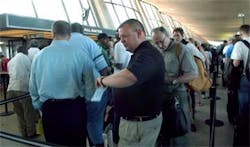WASHINGTON (AP) -- Anyone who took an early flight for a Memorial Day getaway has already gotten a taste of what summer air travel will be like: full planes, crowded airports and weather delays.
Airlines said they carried more passengers than usual Thursday, the kickoff of the summer season. Flights were delayed to some of the biggest airports - Chicago O'Hare, Boston Logan, Newark, N.J., New York LaGuardia and Fort Lauderdale, Fla. - according to the Federal Aviation Administration.
''We had small pockets of weather to contend with in the Northeast and some wind at O'Hare, but overall we got off to a good start,'' said FAA spokesman Greg Martin.
Things went more smoothly in the West, where America West airline has hubs in Phoenix and Las Vegas.
''Everything's going great, we have a really good on-time performance,'' said America West spokesman Phil Gee.
Aviation experts predict the upcoming vacation season could rival 2000, the worst ever for flight delays, cancellations and cranky travelers crammed into airports.
Takeoffs are now returning to pre-Sept. 11, 2001, levels, and millions of tickets have already been sold. Security-related delays are a concern, and so is one thing that no one controls: Mother Nature.
Hot, humid air produces summer thunderstorms, typically in a zone that stretches from Texas to Michigan. They're too high to fly over, too dangerous to fly through and often too wide to fly around.
At hub airports - especially O'Hare - bad weather can combine with huge numbers of passengers to cause delays that cascade through the entire system. That's what happened in 2000, forcing thousands of passengers to sleep on terminal floors or sit fuming while their planes lingered on runways for hours.
Much has been done to improve things since then. Airports have added runways and terminals and improved efficiency, and the FAA has adopted new strategies.
But the system has yet to be tested during a bad thunderstorm season, and the signs so far aren't encouraging.
The Memorial Day rush at Washington Dulles International Airport began early Thursday afternoon as security lines suddenly ballooned to thousands of travelers.
Many took advantage of cheap ticket prices. The average airfare for a 1,000-mile flight is now $118, 20 percent lower than it was in 2000, according to Transportation Department Inspector General Kenneth Mead.
Bargain airfares allowed Nancy Cross, a physician's assistant from Ashburn, Va., to take her husband and two stepdaughters with her to Orlando, Fla., where she was attending a medical conference.
Cross couldn't believe the security line. ''I can't even see where it begins,'' she said, standing on tiptoes.
For the first 10 weeks of this year, slightly more flights were delayed, and delayed longer, than they were during the same period in 2000. Most delays were caused by weather.
Mead said Thursday that six airports are likely to experience delays this summer: Philadelphia, LaGuardia, Newark, Dulles, Atlanta and Fort Lauderdale.
To avoid massive weather disruptions throughout the whole system, the FAA has planned alternate routes based on where storms are likely to develop.
Faster and more accurate weather prediction equipment allows air traffic controllers and the airlines to respond more quickly to changes in weather systems.
The FAA, though, can't control the volume of passengers or delays caused by understaffing at the airlines.
In 2000, there were 698.9 million passenger boardings of commercial planes in the United States, according to the FAA. In 2004, there were almost as many - 698.7 million - and that number is expected to rise in 2005.
Cash-strapped air carriers slashed their work forces in the past few years to save money. U.S. airlines cut 81,717 jobs between July 2000 and July 2004, and another 16,990 by February, leaving a total of 400,253 full-time equivalent workers, according to the Bureau of Transportation Statistics.
Understaffing was responsible for more than 500,000 US Airways passengers being delayed during the December holidays, according to a report issued by Mead. The report criticized the way US Airways Group Inc. handled the shortages of fleet service employees and flight attendants, particularly in Philadelphia.
US Airways spokeswoman Amy Kudwa said the airline is adding staff in key hubs - Washington, Philadelphia and Charlotte, N.C. - as part of a renewed focus on on-time performance. The airline is also working to get flights off the gate and in the air on time by doing things like closing the aircraft door five minutes before departure.
To avoid a repeat of 2000, several airlines have altered their schedules to eliminate rush-hour traffic jams at hub airports.
The FAA also has ordered airlines to reduce their schedules at O'Hare - a hub for both American and United Airlines - during peak travel periods. The move has helped reduce congestion, Mead said.

